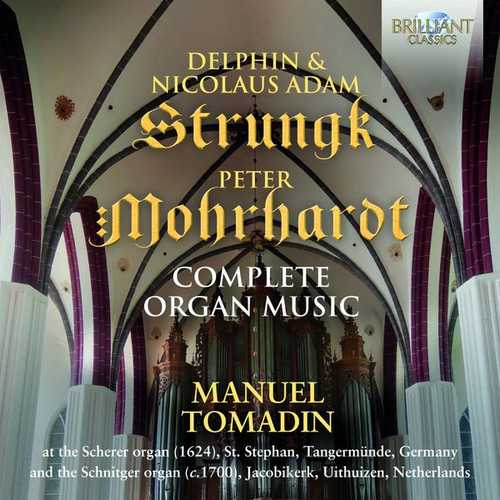
Composer: Delphin Strungk, Peter Morhard, Nicolaus Adam Strungk
Performer: Manuel Tomadin
Format: FLAC (tracks)
Label: Brilliant
Release: 2019
Size: 2.91 GB
Recovery: +3%
Scan: cover
Delphin Strungk:
Tibi laus, tibi gloria
01. I. Prima pars
02. II. Secunda pars
03. Lass mich Dein sein
04. Toccata ad manuale duplex
Ecce Maria genuit nobis
05. I. Prima pars
06. II. Secunda pars. Ecce agnus
07. Ich hab mein Sach Gott heimgestellt
Magnificat noni toni
8. I. Primus versus. Pedaliter
9. II. Secundus versus
0. III. Tertius versus
11. Verbum caro factum est
12. Surrexit pastor bonus
Peter Morhard:
Kyrie
13. Kyrie
14. Kyrie: Christe
15. Kyrie
16. Du Friedefurst, Herr Jesu Christ
17. Gelobet seist du, Jesu Christ
18. Was furchtst du, Feind Herodes, sehr
19. Alle Welt, was lebt und webet
20. Allein zu dir, Herr Jesu Christ
21. Meine Seele erhebt den Herren – I. Primus versus: Manibus solis – II. Secundum versus: Ad manuale duplex cum ped
22. Wacht auf, ihr Christen alle
23. 4Aus tiefer Not schrei ich zu Dir
24. Herr Gott, dich loben wir
Nicolaus Adam Strungk:
25. Capriccio in G minor
26. Capriccio in A minor
27. Capriccio in E minor
28. Capriccio in F major
29. Capriccio in A Minor
30. Capriccio in D Minor
31. Ricercar Sopra la Morte della mia carissima Madre Catharina Maria
32. Capriccio on Ich dank dir schon durch deinen Sohn
In this release we dive headfirst into 17th-century Northern Germany, a time of innovation and experimentation in music for the organ. As these imposing instruments were installed in cathedrals across Europe, the repertoire flourished. Three composers grace this set: Delphin Strungk, his son Nicolaus Adam Strungk and Peter Mohrhardt, and their musical output sheds light on the transition period between the Renaissance and Baroque eras.
Delphin Strungk opens the set with an organ arrangement of a motet by Orlando di Lasso, a pioneer of the polyphonic style. Strungk was a highly respected organist and took up several posts during his lifetime including one as the court organist in Celle. His performances won him international acclaim and academics from across the continent would come to hear him play.
Magnificat noni toni was a favourite of Duke Rudolph Augustus, Prince of Brunswick-Wolfenbüttel, who often came to Braunschweig to watch him play. Strungk explores the potential of the instrument and uses special echo effects in several pieces. It’s a technique also employed by Jan Pieterszoon Sweelinck, and it’s possible Strungk was one of his pupils.
Peter Mohrhardt moved in the same musical circles as Strungk but fewer of his compositions have survived, all of which are included here. His pieces reflect the influence of Sweelinck and Scheidemann, including echo effects, for example. However his music is also forward-looking, and the arrangements feature a highly ornamented cantus firmus, while the chorale fantasias show off the virtuosity of the performer, typical of Baroque keyboard music.
Nicolaus Adam Strungk was active at the same time as Mohrhardt. As the son of Delphin Strungk, he grew up under the guidance of his father and was employed by various members of the nobility, later performing for the emperor Leopold I. As the most modern composer of the three, technological advancements in organ building, such as the introduction of tempered tunings, allowed the composer to experiment with new tonalities. Admired by J.S. Bach, Strungk was influenced by Arcangelo Corelli, whom he met in Rome in 1685. This was the same year that Strungk learned of the death of his mother, inspiring his Ricercar sopra la morte della mia carissima Madre, whose melancholy melody bears clear signs of the Italian master’s influence.